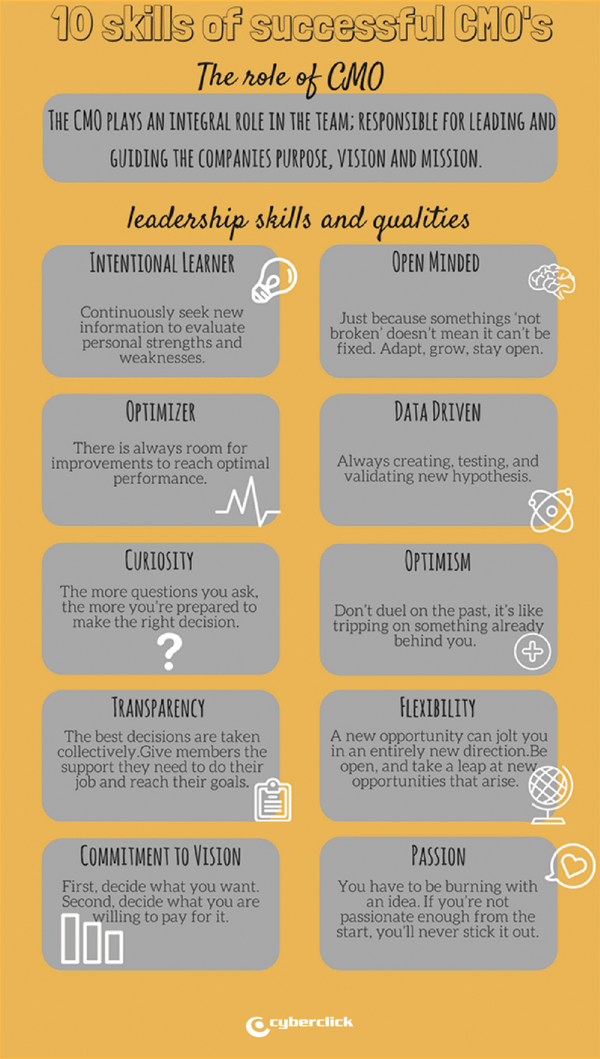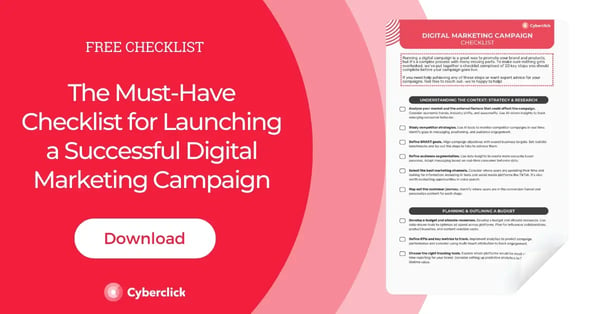For a successful CMO (Chief Marketing Officer) taking on an authoritative role is no longer enough, they must go beyond and take on the role of a leader. An influential CMO will lead their team with a clear purpose, vision, and mission. One that their team identifies itself with.
The volatile marketing environment calls for innovators, those who thrive in uncertain situations of rapidly evolving technologies. Those who embrace the challenge of uncertainty, and can use new tools to their advantage, are the CMO’s that will rise with their team and with their firm.
Traditionally, to face the challenge, a CMO carried a ‘toolkit of knowledge’ acquired through education and has implemented this over years. Every 3-5 years this ‘toolkit of knowledge’ would be upgraded or replaced to tackle new challenges arising. Today’s reality is, the fast changing digital environment, requires a faster, almost continuously adapting ‘toolkit of knowledge’. There are certain attributes that will ensure you always come out on top.

10 Skills of a Successful CMO
1. Intentional Learner
Go out of your way to continuously acquire new information and data which can help you spot areas for improvement. Campaign analytics and competitive analysis are a perfect place to start evaluating personal strengths and weaknesses
2. Open Minded
Just because somethings ‘not broken’ doesn’t mean it can’t be fixed. With new technologies arising faster than we can realize, it’s important to always try and find a better way. Learning to adapt and grow is the only way to ensure staying ahead.
3. Optimizer
Like professional athletes, leaders know there is always room for improvements to reach optimal performance. Strive for improvements every single day in your personal and professional life. By continuously optimizing, you can empower yourself and the people around you to become more effective.
4. Data Driven
Always creating, testing, and validating new hypothesis. Understanding the science behind digital marketing and testing out new methods is essential for innovation.
5. Curiosity
The more questions you ask, the more you’re prepared to make the right decision. When you stay curious and start asking the right questions, you are increasing your probability of finding the right answers, the ones that make you grow.
6. Optimism
Embrace all your challenges through a positive lens. Positivity is contagious, so start spreading it. When something does go wrong, stay optimistic. Every failure is a new opportunity to learn, a new experience that will make you stronger and an experience that gives you fresh perspective. Don’t duel on the past, it’s like tripping on something already behind you.
7. Transparency
Successful 21st century firms prove the best decisions are taken collectively. Make all the tools and information available to enable everyone to play an integrate role in the decision making process. Give members the support they need to do their job and reach their goals for a long term mutually beneficial relationship.
8. Flexibility
Keep your plans flexible. Each day could bring a new opportunity that could jolt you in an entirely new direction. These can enable new pathways to reaching our goals quicker and more effectively. Be open, and take a leap at new opportunities that arise.
9. Commitment to Vision
Devote to your vision, and stick to it in sickness and in health. H.L. Hunt sets out the straightforward requirements for success. First, decide what you want. Second, decide what you are willing to pay for it. Third, resolve to pay that price.
10. Passion
‘You have to be burning with an idea, or a problem, or a wrong that you want to right. If you’re not passionate enough from the start, you’ll never stick it out.’ – Steve Jobs
To successfully fill the role of digital CMO, be a steward of teamwork, a pioneer of thought, and the leader of a vision.
Chief Marketing Officer: How to Adapt Yourself and Your Digital Marketing Strategy
Darwin already said it: the only species that are likely to grow and prosper are those who are able to adapt to their environment, and the ecosystem of marketing is no exception. Today it is more important than ever for marketers to keep up with new trends, technologies, strategies and campaign methods, especially in the online environment. Marketing directors, adapt yourself or nobody will understand you!
Social media, inbound marketing, native advertising…in recent years we have experienced a true "digital revolution" that has completely changed our understanding of marketing. We have more data than we can ever, we can communicate in real time with our users, and preferences and paradigms change within a matter of months. Amid all this turbulence, the marketing director should be able to carry the brand to success without neglecting the flexibility in terms of strategies and actions.
The problem is that lessons learned at university, business school or working in an offline environment no longer apply. If you work as a marketer, understand and live the new online world, it is essential to communicate with customers, with employees of your company and even your children. What can you do to adapt to the new marketing landscape?
- Practice, practice, practice. You cannot explain a world that you no longer form apart of to others, nor should you propose strategies based apps if they are not part of your daily life. Find new ways to integrate digital into your daily life and see what it brings to your life ... and what you can bring to your advertisers and users.
- Don’t be afraid to try new things. The absolute certainties no longer exist, and the only way to gain experience is by doing experiments. Dare to innovate and learn more from your mistakes than your successes.
- Analyzes the results. Experience is useless unless you know exactly what is working and what is not. Before launching your new campaign, you have to decide which metrics you will use to evaluate results and establish frequent checks to see how it is evolving. If something does not work, you can always adjust your strategies.
- Lose the fear of change. In the current environment of online marketing, the biggest mistake is to cling on to the old ways of doing things and keep waiting for them to work. A positive attitude to change is one of the best assets to make your job easier as a marketing director. Good luck!
- Learn from others. We're all in the same boat and we can benefit from the knowledge acquired by others. A simple way to harness the wisdom of others is through recent digital marketing studies. For example, you can use them to guide you on when and when not to publish on social networks. Take our Digital Marketing Trends 2016 survey below and we will send you the results to improve your strategy for the New Year!
Chief Marketing Officer: How to Adapt your Brand
1. Saving your brand from the apocalypse
Just over 32 years ago, on September 26, 1983, a hero saved the world from a nuclear apocalypse. His name was Stanislaw Petrov. That night he was coordinating Petrof Russian aerospace defense from his command post at the Centre for Early Warning of military intelligence of the USSR, where he had come to replace a sick colleague. The Cold War had reached a point of maximum tension, and orders were clear: shoot the full arsenal at the first indication of a nuclear attack. A few weeks earlier, a South Korean plane line had mistakenly entered Soviet airspace was shot down without warning killing 269 people, including a senator and several US citizens.
At 12:14 am on the 26th, all alerts of the command post jumped with the message that a missile had been launched from a US base. Alerting of the nuclear attack to the top officials was in the hands of Petrof, which would trigger a counterattack that could kill millions.
Petrof remained calm and asked everyone to do his or her job. The margin was 20 minutes until the missile course landed in the USSR. Meanwhile, systems warned the launch of four nuclear missiles from the United States.
Petrov knew that the system could have failures, but five consecutive failures seemed highly unlikely. Moreover, such an attack did not make sense: having decided to act, the United States would have done so with full force and not with five isolated missiles. Besides, it was a suicidal and crazy maneuver. So finally he alerted the Soviet leadership of a system malfunction ... and hit. Thanks to his common sense, it is estimated that between 300 and 400 billion people were saved from dying in a nuclear holocaust.
Although marketing is far from being a matter of life and death, the history of Petrof reminds us of the daily work of many marketing directors.
2. Put systems in place for collecting data, alerts and protocols
As Petrof’s command post, a good marketing director must know how to put systems in place for collecting data, alerts and protocols. For example, be able to detect early if a wave of negative reputation around the brand is generated and how to act quickly to minimize the consequences.
When making decisions, a marketing manager must show calm and coolness. The future of the brand may be at stake, but as the "captain of the ship" he or she should never lose their nerves or be carried away by emotions. Often, this professional has to make decisions without 100% of the necessary information. Intuition and common sense are key to save the brand qualities of potential disasters.
3. Performance under pressure
The marketing manager has to perform under pressure, as it has behind them an advertiser who only cares about results and must justify every detail of your investment. Luckily, if you make a mistake, the consequences for humanity will be much less severe.
CEO y cofundador de Cyberclick. Cuenta con más de 25 años de experiencia en el mundo online. Es ingeniero y cursó un programa de Entrepreneurship en MIT, Massachusetts Institute of Technology. En 2012 fue nombrado uno de los 20 emprendedores más influyentes en España, menores de 40 años, según la Global Entrepreneurship Week 2012 e IESE. Autor de "La empresa más feliz del mundo" y "Diario de un Millennial".
CEO and co-founder of Cyberclick. David Tomas has more than 25 years of experience in the online world. He is an engineer and completed an Entrepreneurship program at MIT, Massachusetts Institute of Technology. In 2012 he was named one of the 20 most influential entrepreneurs in Spain, under the age of 40, according to Global Entrepreneurship Week 2012 and IESE. Author of "The Happiest Company in the World" and "Diary of a Millennial".




Leave your comment and join the conversation